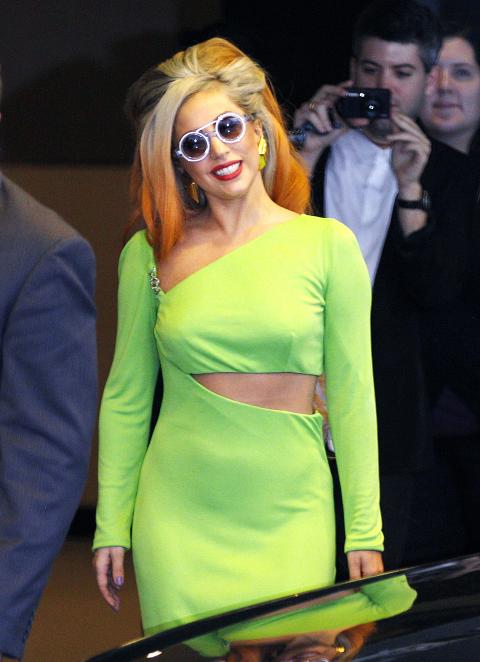The “Mother Monster” — aka Lady Gaga — is in Taipei for a two-night run that began yesterday and ends with a sold-out show tonight at the Taipei World Trade Center Nangang Exhibition Hall (台北世界貿易中心南港展覽館).
The ever-predictable frenzy got underway as soon as the pop sensation stepped off her private chartered plane at Songshan Airport in Taipei on Wednesday. Decked out in a vintage green Versace dress, Lady Gaga greeted reporters and fans at the terminal, “walking unhurriedly, waving at the cameras and blowing kisses,” as the Taipei Times’ sister paper, the Liberty Times, put it.
She then boarded a black Mercedes, protected by a motorcade of M Class Mercedes SUVs, and headed to the W Hotel, where the singer is staying. Naturally, the reporters hopped in their cars and were in hot pursuit, with one TV cameraman even pulling a Dukes of Hazard move, hanging outside the window with his camera on one shoulder.

Photo: Taipei Times
But the real shots to capture were at the W Hotel, where 100 or so “little monsters” got a few minutes of interaction with Mother Monster (albeit from behind a metal fence). Lady Gaga obliged the shrieking fans, approaching them as soon as she stepped out of the car at the hotel, shaking hands and signing autographs.
One female fan, according to Now News (今日新聞網), was lucky enough to attract Lady Gaga’s attention. The student had made a pair of rings, one of which she gave to the singer, who accepted the gift and returned the favor by kissing the matching ring on the student’s hand.
Lady Gaga fans in Taiwan, some of whom shelled out more than NT$12,000 for tickets each for yesterday and tonight’s concerts, will be seeing the singer fulfill a promise to return after giving a free mini-concert in Taichung last year.
But Lady Gaga fans in Indonesia won’t be as fortunate: the diva was denied a permit to hold a concert, which was scheduled for June 3, in Jakarta after some of the country’s Muslim hardliners accused her of, among other things, worshipping Satan.
Back in Mando-pop land, Aska Yang (楊宗緯) is smarting over his failure to get nominated for the best male Mandarin singer gong at the 23rd Golden Melody Awards (第23屆金曲獎). The ceremony takes place next month. Yang, who became a household name as a contestant on the reality show One Million Star (超級星光大道), recruited respected pop singer-songwriter Jonathan Lee (李宗盛) to produce his chart-topping album Pure (原色).
But even that apparently did not impress the Golden Melody committee judges. The China Times quoted one representative as saying that Yang “did not enter the discussion from the start.” There were few surprises for this year’s nominees for best male singer, which include Jam Hsiao (蕭敬騰), Eason Chan (陳奕迅) and Jay Chou (周杰倫).
But all eyes at this year’s awards will be on Singaporean singer Tanya Chua (蔡健雅), pop-rock idols Mayday (五月天) and S.H.E singer Hebe Tien (田馥甄), who each received seven nominations. All three artists are vying for the year’s best Mandarin album and best composer awards.

The primaries for this year’s nine-in-one local elections in November began early in this election cycle, starting last autumn. The local press has been full of tales of intrigue, betrayal, infighting and drama going back to the summer of 2024. This is not widely covered in the English-language press, and the nine-in-one elections are not well understood. The nine-in-one elections refer to the nine levels of local governments that go to the ballot, from the neighborhood and village borough chief level on up to the city mayor and county commissioner level. The main focus is on the 22 special municipality

The People’s Republic of China (PRC) invaded Vietnam in 1979, following a year of increasingly tense relations between the two states. Beijing viewed Vietnam’s close relations with Soviet Russia as a threat. One of the pretexts it used was the alleged mistreatment of the ethnic Chinese in Vietnam. Tension between the ethnic Chinese and governments in Vietnam had been ongoing for decades. The French used to play off the Vietnamese against the Chinese as a divide-and-rule strategy. The Saigon government in 1956 compelled all Vietnam-born Chinese to adopt Vietnamese citizenship. It also banned them from 11 trades they had previously

In the 2010s, the Communist Party of China (CCP) began cracking down on Christian churches. Media reports said at the time that various versions of Protestant Christianity were likely the fastest growing religions in the People’s Republic of China (PRC). The crackdown was part of a campaign that in turn was part of a larger movement to bring religion under party control. For the Protestant churches, “the government’s aim has been to force all churches into the state-controlled organization,” according to a 2023 article in Christianity Today. That piece was centered on Wang Yi (王怡), the fiery, charismatic pastor of the

Hsu Pu-liao (許不了) never lived to see the premiere of his most successful film, The Clown and the Swan (小丑與天鵝, 1985). The movie, which starred Hsu, the “Taiwanese Charlie Chaplin,” outgrossed Jackie Chan’s Heart of Dragon (龍的心), earning NT$9.2 million at the local box office. Forty years after its premiere, the film has become the Taiwan Film and Audiovisual Institute’s (TFAI) 100th restoration. “It is the only one of Hsu’s films whose original negative survived,” says director Kevin Chu (朱延平), one of Taiwan’s most commercially successful